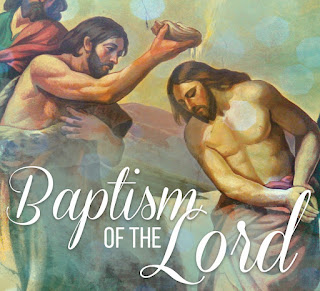BAPTISM RESTORES LIFE TO OUR SOULS
Homily for the Feast of the Baptism of the Lord, Year C
Fr. Ugochukwu
Ugwoke, ISch
Scriptural
Texts: Isaiah 40:1-5.9-11, Titus 2:11-14. 3:4-7, Luke 3:15-16.21-22
Today
is the feast of the baptism of the Lord and with this celebration, we
officially conclude the Christmas season. Today’s feast comes to refresh our
minds on the meaning and importance of baptism as a sacrament. As the first of
the three sacraments of initiation, baptism is the doorway to the new life of
faith. The fact that the baptism of the Lord took place at the beginning of his
public ministry goes to show us that the sacrament of baptism gives us our
identity and introduces us to our mission as Christians.
The
baptism of John which Christ received and which we read about in today’s gospel
reading is a baptism of repentance for the forgiveness of sins (Mark 1:4). As
such, Jesus, being sinless (Hebrew 4:15), had no need to be cleansed by the
waters of baptism. But by his voluntary descent into the Jordan, he sanctified
the waters of baptism. Jesus came forward to be baptized by John not for his
own benefit but for our own benefit. Through his baptism, he identified with us
sinners so as to liberate us. Also, his baptism is salvific because it
foreshadows his death and resurrection. The descent (immersion) into the waters
is a form of death and burial and his emergence and rising after baptism is a
form of resurrection.
The
effect of Christ’s baptism was different because he was without sin. But for us
who inherited Original Sin, we all came into the world with a soul that is
supernaturally dead. What this means is that the supernatural life which is the
result of God’s personal and intimate indwelling, is absent from the soul at
birth. The Original Sin is a spiritual vacuum that makes us unable to
participate in the life of God. But through the sacrament of baptism, grace is
given to our soul. This grace is given for two basic reasons: to wash and heal
us of the wounds of Original Sin, and to enable us carry out works of
supernatural virtue. This grace which we receive at baptism is known as the
sanctifying grace and it is the grace for personal holiness or union with God.
It is the grace that dissipates the spiritual emptiness of Original Sin.
As
Jesus during his baptism, was revealed as the beloved Son of the Father, so too
do we receive a new identity in baptism as adopted children of the Father.
While Jesus is the Son of God by generation, we are God’s children by adoption.
Or as St, Paul says in the second reading, through baptism, we become heirs of
heaven (Titus 3:7). The fact that we are adopted children of God means that we
possess some dignity and status. We should always strive to ensure that our way
of life does not betray our status as adopted children of God.
Lastly,
on the feast of the baptism of the Lord, our attention is once again drawn to
those promises we made (either directly or indirectly) on the day of our
baptism. We denounced Satan, his works and vain enticements. We also pledged
our unalloyed belief and loyalty to the Triune God and to other doctrines of
our faith. We are called upon today to make a personal assessment of our
efforts. Have we been faithful to our baptismal promises or have we accepted
what we denounced and denied what we professed? We pray that the Lord may keep
granting us the grace to be faithful to our baptismal promises.



Thanks and happy Sunday Fr
ReplyDeleteAmen.
ReplyDelete